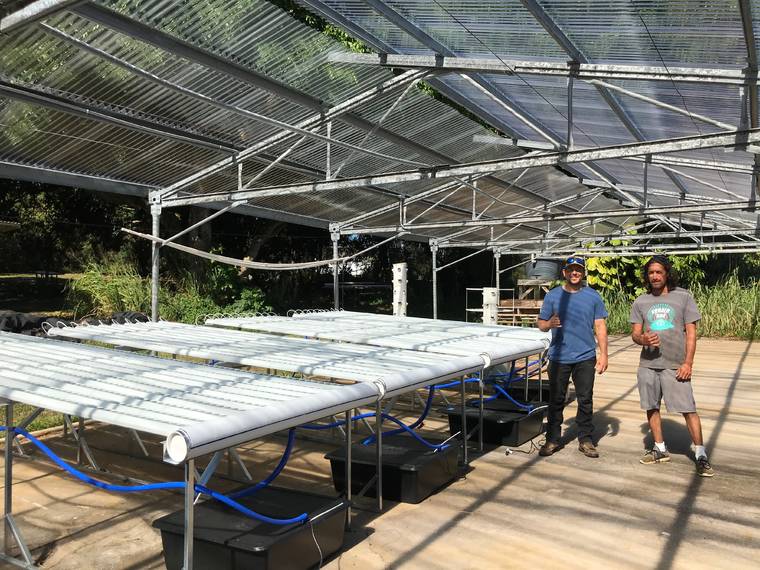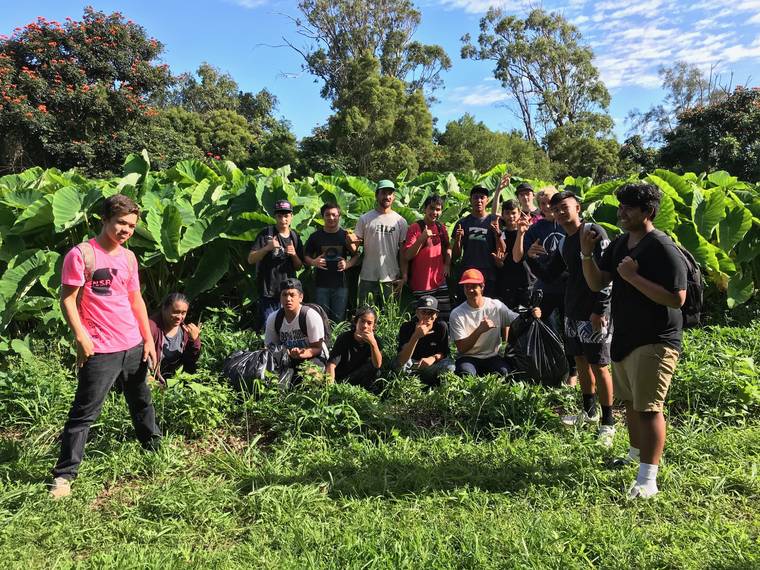NORTH KOHALA — This past semester at Kohala High School has, with lots of help, enhanced garden-to-school efforts thanks to dedicated partnerships between KHS, community investors, and the Hawaii Institute of Pacific Agriculture.
HIP Ag — a nonprofit located in Kapaau with a mission to practice and teach regenerative agriculture — has been bringing resources including staff time and funding to reestablish the school’s farm since 2017.
Today, the KHS school’s farm is multifaceted including a market garden featuring kalo and heirloom vegetable varieties, a fruit tree orchard with 50 varietal fruit trees, and animal husbandry including a pig trap and a movable chicken coop.
Recently, the existing but nonfunctional aquaculture system was fixed thanks to a generous donation from Ulupono Initiative and installation help from local experts from Kohala Mountain Fish and student parents.
The aquaculture system is near completion featuring specialized aeration plus a three-stage filtration system and is ready to welcome tilapia into its operation. The existing greenhouse, used as a nursery and now hydroponic station, also has a brand new roof thanks to collaborative funds from Ulupono Initiative and the Department of Education.
All of these efforts have not come without the hard work and dedication from KHS students of the five classes that currently participate with the school’s farm.
“When I started last year in production class the farm was overgrown with tall cane grass and both the greenhouse and aquaculture areas were a real mess,” 10th-grader Gibson Polevia said. “Last year, we installed a garden and cleared out the other production spaces. I’m proud to see the transformation.”
Other students shared that they were excited to see the tilapia go in soon and that they would like to see the fish served in the cafeteria because it “tastes ono fried.”
Once the fish arrive the system has the ability to produce 2,000 pounds of tilapia every six months (4,000 pounds per school year) and will hopefully feed into the school’s cafeteria.
With the newly repaired greenhouse, KHS has also added hydroponics to their school’s farming operations thanks to the expertise of Dean Snelling, KHS’s new full-time natural resource and productions instructor.
Snelling shared that when he started he wanted to introduce a project that would require student participation throughout their entire school year. He liked the idea of introducing hydroponics under the new greenhouse roof because it fit the garden-to-cafeteria model and its curriculum teaches a lot more than just growing food.
Snelling went on to explain that hydroponics is a soil-less growing method that uses nutrient-fed water which involves chemistry and math while the build-out involves engineering and design. Ultimately, their goal is to grow roughly 20 pounds of greens per week including lettuce and bok choy to be used for the Kohala Complex school lunch program.
For over two years HIP Ag has been supplying weekly drops of fresh produce to the cafeteria.
As a community partner with KHS, HIP Ag has focused additional staff resources to revitalize the school farm, and begin to develop curriculum and cropping schedules that are replicable. With the cafeteria’s recent order these efforts came together empowering the students to grow fresh food for their school. “With F2S (farm-to-school) there is a huge possibility of opening up new guaranteed markets that can provide a real livelihood to young local farmers.”
“HIP Ag is dedicated to restoring the school farm so we can train the next generation of crop producers to feed our schools and community,” said Dash Kuhr, executive director of HIP Ag.
This year alone students have grown, harvested, and delivered over 125 pounds of produce to the school’s cafeteria in addition to 1,416 pounds of produce including bananas, sugar cane, eggplants, green beans, bak choi, lau leaf, and sweet potatoes to staff, students and their families.
It’s inspiring to see Kohala schools teaching these innovative, cross-curricular, and place-based lessons while growing more food on campus to reach their students and school cafeteria.
These activities make the community more vibrant and nourishing, and their benefits reach beyond the classroom.
“We are working in partnership with the Kohala Complex to develop a K-20 Agriculture Education pipeline that connects students to broader education and work opportunities,” Kuhr added. “The goal is that eventually, students will be able to gain college credits through the HS agriculture program for higher education opportunities within local colleges and universities to later connect them to career training programs like HIP Ag’s Farm Apprenticeship, Go Farm Hawaii, or other farms in the state. This program will help to address the growing crisis of a lack of farmers in the state that are producing food and caring for the land.”
To learn more about HIP Ag’s efforts please visit www.hipagriculture.org.






